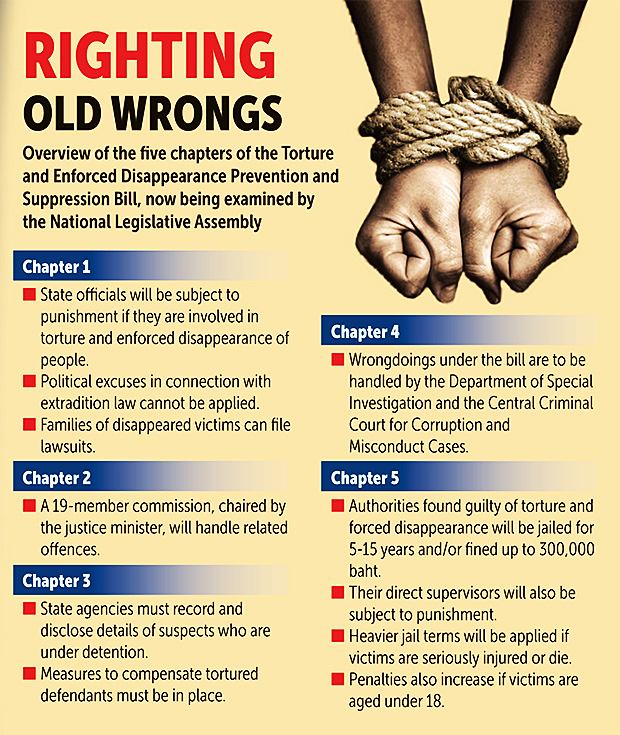Thailand's first-ever draft law to protect people from being abducted illegally by state officials is making its journey through the National Legislative Assembly.
Such "enforced disappearances", thuk um/um hai in Thai, have formed the centre of many high-profile cases where people in conflict with authorities suspiciously went missing, sometimes also involving allegations of torture to extract confessions.

The acts, which have long tarnished the image of state officials, most notably the police force, will be strictly banned under the Torture and Enforced Disappearance Prevention and Suppression bill.
Human rights advocates have expressed cautious optimism but also scepticism as to whether this bill really will improve human rights.
A FINAL TOUCH BY LEGISLATORS
The government began drafting the law in 2014, seven years after Thailand ratified the UN-sponsored Convention against Torture and Other Cruel, Inhuman or Degrading Treatment or Punishment, known as the CAT.
The international pact required the government put in place measures against state-sanctioned acts of this kind, a commitment that gave birth to the bill.
These steps came a decade after the disappearance of human rights lawyer Somchai Neelapaijit was believed to have been enacted by the state as he assisted a group of Muslims who themselves had alleged torture by the police.
The bill, which includes input from many human rights advocacy groups, is undergoing its first reading by the National Legislative Assembly.

Nobody knows whether parts of the bill will be changed or what its final version will look like.
"No one has seen it except the Council of State [the government's legal advisory body]," National Human Rights Commission member Angkhana Neelapaijit, also Somchai's wife, said.
"I only want to see a law that falls in line with the conventions."
Ms Angkhana was not only referring to the CAT, but also the International Convention for the Protection of All Persons from Enforced Disappearance, or CED.
Thailand adopted the latter in 2012 and is currently in the process of ratifying it.
WORRIES OVER LOOPHOLES
One controversial legal touch, which could see the bill deviate from its original draft, is a proposal to remove Section 11 and 12.
Section 11 disallows authorities from citing national security, wars or emergencies as reasons to exempt themselves from the law, while Section 12 prohibits state agencies from extraditing people if such an act will lead to torture or forced disappearance.
"Proponents want to take the two sections out because they say Section 5 and 6 are enough" to discourage officials from wrongdoing, according to Ms Angkhana.
Section 5 and 6 prohibit officials from threatening, torturing, abducting or unfairly treating individuals or groups under arrest or suspicion.
In Ms Angkhana's view, Thai officials still have "problems" complying with the CAT and the CED, so it remains necessary to keep Section 11 and 12 in the bill.
MATCHING THE LAW WITH THE CED
Ms Angkhana also wants NLA members to reconsider Section 32 which stipulates senior officials must be punished if they are found to have been aware that subordinates under their direct supervision committed offences under the bill and failed to act.
The word "direct" must be removed in order to ensure the draft law will correspond with the CED, she suggested.
CONCERNS PLAYED DOWN
Narilak Phaechaiyaphum, chief of the Justice Ministry's International Human Rights Division, is aware of the National Human Rights Commission's concerns, but said now may not be the right time to tweak the draft.
Some disagreements and suggestions given by the human rights watchdog are "too detailed", believes Ms Narilak. "I think it's better to enact the law first and consider amendments at a later time."
Ms Narilak believes the crucial parts of the bill are already clear enough to help protect people against state abduction.
NO MORE DISAPPEARANCES
Once the law comes into effect, human rights protections in Thailand will be significantly upgraded, Ms Narilak said.
According to the UN Working Group on Enforced or Involuntary Disappearance, at least 78 Thai people went missing in the bloody Black May popular uprising of May 17-20, 1992. The court ruled that 38 of them are "disappeared" persons, but the status of the rest remains unclear to this day, the group said.
But with the new law, the disappearances of people like Mr Somchai and other social activists such as Porlajee "Billy" Rakchongcharoen and Den Khamlae are less likely to recur, they said.
Karen rights activists Porlajee was last seen on April 17, 2014, after being arrested by officials at Kaeng Krachan National Park in Phetchaburi.
His disappearance came as he was involved in helping members of the Karen ethnic group to sue former national park chief Chaiwat Limlikitaksorn for setting fire to their bamboo huts and rice barns in a series of forest evictions.
In 2016, Den, who campaigned for land rights for the poor, went missing in a forest in Chaiyaphum on April 16.
His disappearance came shortly after forestry and military officials cited a court order to evict people accused of encroaching on the Phu Sum Puk Nam Sanctuary in the province.
TIMING DEBATE
Many do not believe the bill should be vetted thoroughly and not fast-tracked, yet some justice officials have begun to suggest it should be passed sooner rather than later.
"We've spent a very long time drafting the law," Ms Narilak said, adding that without the support of the current military-engineered government, the bill would not have got this far.
Her ministry will press on with efforts to see the bill become law, she said.
But Amnesty International Thailand director Piyanut Kotsan echoed Ms Angkhana's concerns, suggesting she would rather wait for a law that guarantees the country will have a legally effective tool.
"We can accept its delay," she said. "It's better than having a quick enactment but slow arrival of justice as a result."